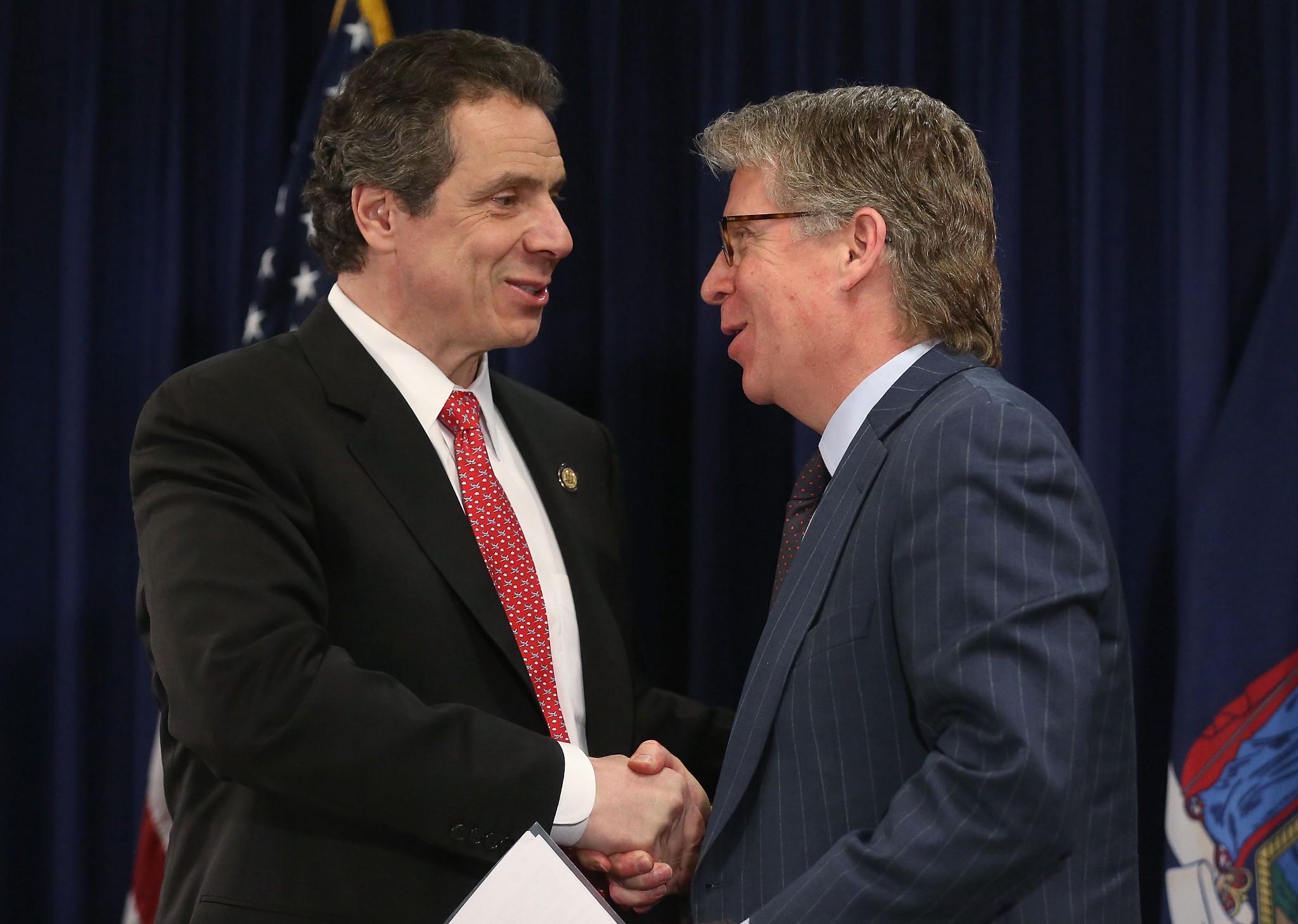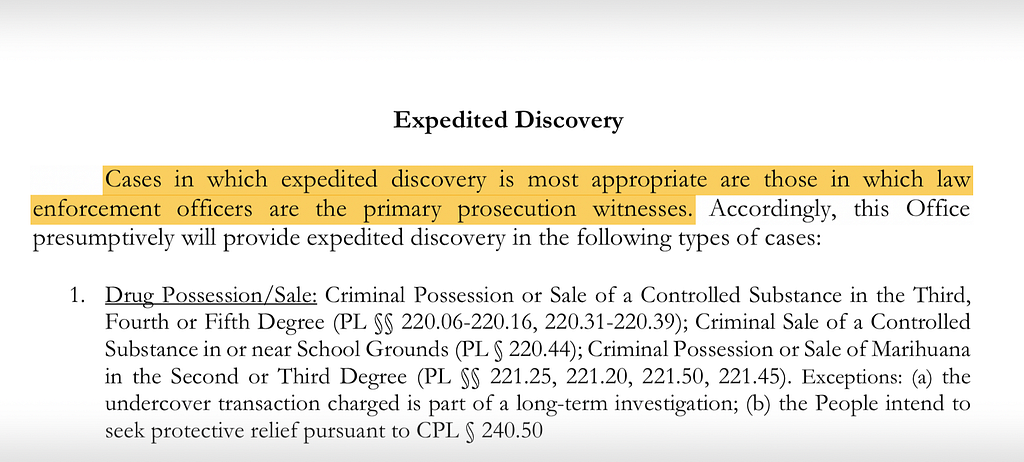Movement to Reform New York’s Discovery Statute Faces A Familiar Foe: Prosecutors
By the time Steven Odiase learned of the evidence that would set him free, he’d already spent six years in prison for murder.

By the time Steven Odiase learned of the evidence that would set him free, he’d already spent six years in prison for murder. The Bronx district attorney pushed for Odiase’s conviction in the fatal shooting of 15-year-old Juan Jerez in 2009, based on the testimony of a single witness who put him at the scene. Then, in March of last year, his attorneys made a startling a discovery: a police report containing the statement of a previously unknown witness, whose physical description of the shooter did not resemble Odiase.
Years earlier, Bronx Assistant District Attorney Adam Oustatcher had received that very same police report. But before sharing such exculpatory material with the defense, as is required by law under Brady v Maryland, he first redacted the information unfavorable to his case. When Odiase’s attorneys did receive a copy of the report, there was no sign that detectives had ever spoken to the second witness. That change was made deliberately, by Oustatcher’s own admission, as part of the office’s policy of withholding information that could harm witnesses. Altering the report, he said, was “normal practice.”
Oustatcher, who now works for a Long-Island based law firm, will likely face no consequences for his actions. Prosecutors are rarely disciplined for even egregious misconduct; a 2016 Innocence Project report found that in 660 cases in which misconduct was identified, only one prosecutor was sanctioned.
In the months since the redaction in the Odiase case was made public, a growing reform movement has seized on the methods by which prosecutors provide crucial evidence to the defense. Known as criminal discovery, the process has garnered particular scrutiny in New York, where a so-called “blindfold law” allows prosecutors to withhold vast amounts of information — including police reports, witness statements, and grand jury testimony — until just before a trial which makes it difficult, if not impossible, for defense attorneys to properly investigate and prepare their case. A failure to present an adequate defense violates a defendant’s Sixth Amendment rights — “T]he right to counsel is the right to the effective assistance of counsel.”
But because of the “Blindfold law” and the fact that by one estimate only about 5 percent of cases ever go to trial, defendants frequently plead guilty without fully knowing the case against them. In the rare instances that defendants do go to trial, it’s not uncommon for witness statements to be provided to attorneys only hours beforehand. And then there are cases like Odiase’s, where prosecutors deliberately hide exculpatory evidence from defense attorneys — around 38 percent of the state’s 234 exonerations are caused by such Brady violations, according to the National Registry of Exonerations.
“New York’s broken discovery statute has empowered prosecutors for decades with an enormous advantage over the defense, undermining fairness and due process,” Tina Luongo, Attorney-In-Charge of the Criminal Defense Practice at the Legal Aid Society, told The Appeal. Similarly restrictive discovery laws can only be found in Wyoming, South Carolina, and Louisiana, a state known for having the highest incarceration rate in the world and rampant prosecutorial misconduct. Meanwhile, at least 35 other states (including New Jersey) have broad and early discovery, meaning that prosecutors turn over critical information like police reports and witness statements early in a case, without requiring defendants to file motions with the court to obtain them.
Despite the Manhattan district attorney’s office’s claim that “there is no empirical evidence that open-file discovery leads to more efficiency,” a host of studies suggest just the opposite. In a 2016 study published in the Washington and Lee Law Review, researchers compared closed file discovery in Virginia with open discovery in North Carolina, and arrived at a “data-driven endorsement of the idea that open-file discovery could facilitate more informed and more efficient case dispositions.” That same year, a report from the New York Mayor’s Office of Criminal Justice concluded that “standardized, broader and earlier exchange of discovery materials can promote quicker case resolutions.”
Defense attorneys have been arguing for broader and more open discovery policies for years, but it’s only recently that the state legislature has signaled a willingness to bring New York in line with the national mainstream. A bill introduced last January in the state assembly would add New York to the growing list of open file states, and it has the support of the New York State Bar Association, the Legal Aid Society, and the Innocence Project. Companion legislation is currently in committee in the state senate. Governor Cuomo voiced his support for “expanding the discovery process” last month, as part of a five-pronged legislative package aimed, in theory at least, at improving access to the justice system.
Of course, not everyone is thrilled that the logjam in Albany seems ready to break. Citing concerns over the safety of civilian witnesses, the District Attorneys Association of New York (DAASNY) has long opposed broader discovery policies and, according to Luong, is now actively lobbying against comprehensive reform. DA Associations are extremely effective in influencing public policy and unsurprisingly DAASNY’s opposition may be working, as evidenced by a slew of loopholes in Cuomo’s proposal, including the creation of an expansive “right of redaction” of witness information by prosecutors.
The Legal Aid Society said such a “right of redaction” will give prosecutors “blanket authority” to blackout the identifying information of witnesses. Defense attorneys cannot adequately prepare and investigate their cases without identifying and interviewing such witnesses. As well, under the Cuomo proposal, prosecutors could justify redactions based on a list of over one dozen qualifying considerations including a defendant’s reputation, alleged gang affiliation and perceived “public safety threat.” Perhaps most damagingly, the Cuomo proposal greatly expands the discovery that must be turned over by the defense, meaning that, according to Legal Aid, “the defense would have to turn over its witnesses’ statements before the prosecution has turned over its witnesses’ statements — and long before the prosecution is required to turn over the Grand Jury minutes of its witnesses.”
DAASNY President Scott McNamara told The Appeal that he was pleased with the “right of redaction” language, and was adamant that the differences between upstate and downstate courthouses make open discovery a nonstarter. Asked how the 35 other states that have broader and more open discovery manage to get around this problem, he responded, “New York is one of the safest states in the country, so why do we always feel that what we’re doing is wrong and we have to modify it to what someone else is doing?”
That sentiment was echoed by the city’s district attorneys during a recent City Council hearing on discovery reform. With the exception of the Brooklyn DA’s Office, which independently adopted open and early discovery in the 90s, representatives from each of the borough prosecutors’ offices cited witness safety concerns in explaining their reluctance to support the proposed discovery reforms. Robert Master, an assistant district attorney in Queens, was perhaps the most forceful opponent of the reforms, warning of “a unilateral renegotiation of the ‘See Something, Say Something’ social contract” if open discovery is passed at the state level. At the same time, each of the DA’s offices representatives insisted that their offices have taken steps in recent years to streamline the pre-trial information sharing process.

But defense attorneys say that minor policy shifts — like the Manhattan DA’s announcement of “expedited discovery” last year, which applies only to police witnesses — mean little in the absence of comprehensive changes to the state statute. They note that the promise of reform rings particularly hollow coming from Cy Vance’s office, which has earned a reputation for not only redacting the names of witnesses, but complainants as well.
“It’s a trial by ambush strategy, because the majority of the evidence that you’re given does not make sense without the name of the complainant or any of the witnesses,” says Rebecca Kavanagh, an attorney with the Legal Aid Society. As for the prosecutors’ fear about witness protection, Kavanagh sees their concern as “an absolute smoke screen” deployed to maintain a strategic advantage over the defense.
Yet despite the best efforts of prosecutors, many in New York’s public defense community are still confident that the state’s “blindfold law” will soon be lifted. “If former Texas Governor and current Trump administration Energy Secretary Rick Perry can enact one of the most comprehensive discovery reforms in the country,” notes Legal Aid’s Luong, “surely New York can.”
